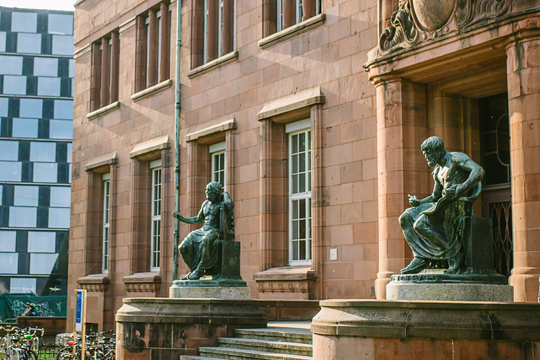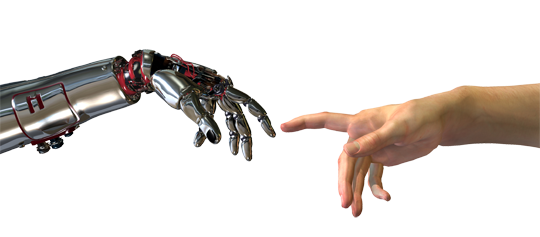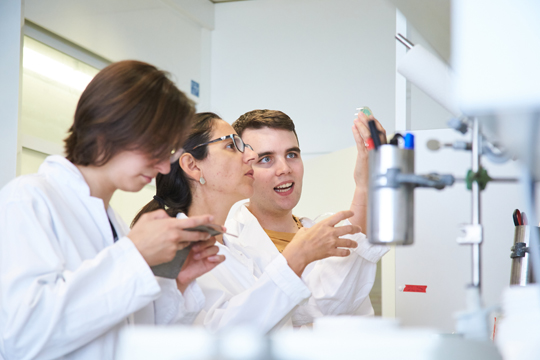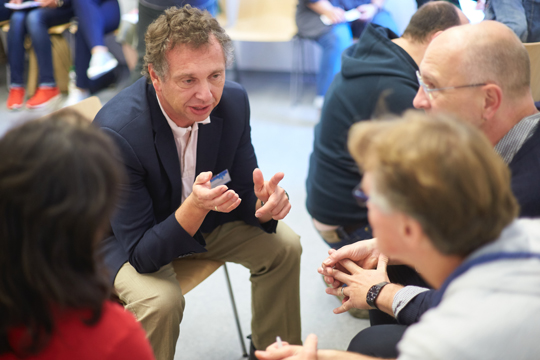Team Spirit and Creativity
Freiburg, Oct 24, 2019
The University of Freiburg invites its members to join in discussions about prospects for the future development of our university in view of the result of the Excellence Competition. Cultural change, creativity and openness will help to shape this path in the future and guide a transformational institutional process, releasing new energy for the core tasks of teaching, research and innovation.

Foto: Sandra Meyndt
“We’re disappointed but not discouraged,” says Rector Prof. Dr. Hans-Jochen Schiewer of the prevailing mood at the University of Freiburg, after its application for the Excellence Strategy Universities of Excellence funding line was turned down in July 2019. More than 1,000 members of the university were involved in the application – students, researchers, staff from administration, services and technology. “We want to maintain this incredible team spirit in order to push ahead with cultural change at our university.”
The goal has to involve building on familiar unique selling propositions and strengths in all areas of activity and drawing on criticism constructively to make improvements. The starting point for both is the letter from the German Council of Science and Humanities (Wissenschaftsrat) in answer to the University of Freiburg’s application. It praises our academic performance in most profile fields, especially in Biological Signalling Studies and Functional and Bioinspired Materials, which won Clusters of Excellence for the university in 2018. In addition it praised the Freiburg Institute for Advanced Studies (FRIAS) as an “outstanding, internationally recognized research college” and a “driver of innovation and interdisciplinary networking”, the University College Freiburg (UCF) as a model for innovative, research-oriented teaching nationally, and the strategic focus of the international cooperation in Eucor – The European Campus, the cross-border association of universities of the Upper Rhine region.
Taking criticism constructively
The university means to take the criticism expressed in the Wissenschaftsrat’s letter constructively. “The global perspectives of our internationalization strategy did not convince them, so we can and must work intensively to address this,” says Prof. Dr. Markus Heinrichs. The psychologist and neuroscientist was speaker for the “Boosting Research” group during the visit of the expert group on behalf of the Universities of Excellence funding line. The university now wants to work out more precisely what strategic added value its international partners contribute to the university’s profile fields in research and teaching. As regards diversity the university intends to focus more on aspects such as origin or age as well – Christian Kröper, representative of the Verfasste Studierendenschaft in the “University Bodies” group, sees this as confirming a demand from the students, “Simply focusing on the question of gender is no longer in keeping with the times.”
In addition, according to the Wissenschaftsrat’s letter there was a lack of focus and unique selling propositions in the “Environment and Sustainability” profile field. “The university has its strengths in the field of environment and sustainability. However these individual mosaic pieces have not yet been formed into a whole. The “Environment and Sustainability” profile field can fill these gaps and sharpen up this area. We will be beginning this process at a workshop in November,” reports Prof. Dr. Daniela Kleinschmit, Faculty of Environment and Natural Resources and speaker for the “Going Global” group. The university also wants to strengthen its other profile fields and at the same time get new Cluster initiatives off the ground. The aim is to raise funds for more than two Clusters of Excellence in the next round of the competition – and on this basis significantly improve our chances of becoming a University of Excellence.
Strong track record
Our starting position remains good: the University of Freiburg has for years been in the Top Ten German universities in all major rankings and nationally among the five or six best non-specialized universities. Nationally, the university wins the most grants in relation to the number of professorships and range of subjects it offers – this was established by the German Research Foundation (DFG) in its latest research atlas. And the University of Freiburg takes leading positions in all the funding programs for young scientists: second place on the DFG’s Heisenberg program, third for Starting Grants from the European Research Council (ERC), and first place for both the Emmy Noether Groups and the Heinz Maier-Leibnitz Prize of the DFG.
“Our track record in recent years shows that under the motto of “Connecting Creative Minds”, with the promotion of creativity and networking, and the continuation of our cultural change, the university has set out on the right path for the future,” emphasizes Rector Hans-Jochen Schiewer. And Prof. Dr. Dr. Andreas Barner, chair of the Freiburg University Council, is convinced that, “A university with members like ours does not have to worry about the future.”
Annual university allowance of 1.75 million euros
The University of Freiburg was successful with both its full applications for the Clusters of Excellence funding line: CIBSS – Centre for Integrative Biological Signalling Studies and livMatS – Living, Adaptive and Energy-autonomous Materials Systems started work in early 2019. At the same time, the university will also receive a “Universitätspauschale” or annual university allowance of 1.75 million euros until the end of 2025 to strengthen its governance and strategic direction. This enables it to implement selected measures to promote cultural change at the university, as described in its application for the Universities of Excellence. Take three examples from research, teaching and administration:

Source: Linda Bucklin/Shutterstock
Saltus!
Breaking new scientific ground with high-risk research projects is the aim of the Saltus! program at the Freiburg Institute for Advanced Studies (FRIAS). It allows researchers at every stage of their career and from any discipline to pursue completely new approaches and ideas and thereby to strengthen the university’s academic ability to renew itself. The innovative strength of the project was crucial as a funding criterion. The first Saltus! group at FRIAS is currently tackling the subject of “Responsible Artificial Intelligence”.

Photo: Harald Neumann
Master Labs
Learning through research in interdisciplinary teams: highly-motivated and high-achieving Masters students are offered the opportunity of gaining initial research experience in Master Labs with scientific guidance and so prepare for a PhD. To the fore are networking and the exchange of ideas with other Masters students, doctoral students and researchers, and the development of one’s own research ideas and designs. CIBSS has already launched its first Master Lab, and another is in development at livMatS.

Photo: Harald Neumann
Connected Services
Supporting research and teaching with professional, service-oriented structures: the University of Freiburg joined the Connected Services project with an opening event in October 2019. The aim is for staff from administration, service and technology, working together with users, to introduce more efficient procedures. The project team has developed a method by which all members of the university can initiate change and improvement processes.
Nicolas Scherger
Excellence Strategy – evaluation and perspectives
The “Excellence Strategy. Evaluation and prospects for the future of our university” event will take place at 5.30 p.m. on 29th October 2019 in the Aula, Kollegiengebäude I. The panel debate will involve amongst others Prof. Dr. Hans-Jochen Schiewer, Rector of the University of Freiburg, Prof. Dr. Dr. Andreas Barner, member of the shareholders’ committee of Boehringer Ingelheim GmbH and chair of the University Council, Dr. Dorothea Rüland, Secretary General of the German Academic Exchange Service (DAAD) and member of the University Council, Dr. Beate Konze-Thomas, former head of the “Programm and Infrastrukturförderung” department of the German Research Foundation (DFG) and until 2018 member of the University Council, and individuals who were involved in the visit by the Universities of Excellence funding line expert group. There will also be a chair on the stage inviting members of the audience to speak. The discussion will be moderated by Prof. Dr. Ralf Poscher, Director of the Max Planck Institute for Foreign and International Criminal Law.

